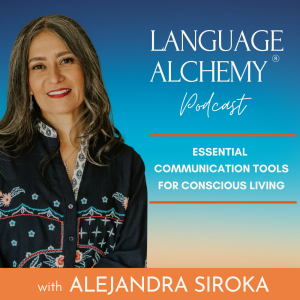
Wednesday Apr 09, 2025
167. How Non-aggressive Is Your Communication? Part 1
Most of us say we want peace in our relationships. So why do we still use words that create tension, distance, or even hurt?
In this episode, Alejandra Siroka invites us to take a closer look at the everyday language we use and how some of it may be doing more harm than we realize. Without meaning to, we may be speaking in ways that shut others down, leads them to feel small, or quietly chip away at trust. Where do those habits come from? And how can we shift toward language that helps people feel safe, respected, and valued?
Alejandra shares four common communication habits that many of us have picked up: interrupting, correcting to be right, shaming, and using body language that overpowers. With clarity and care, she explains why each one matters and offers simple, grounded ways to replace them with more thoughtful patterns.
This isn’t about being perfect. It’s about noticing what’s happening in the space between you and the people you care about and choosing to show up differently. If you long for more connection, ease, and peace in your relationships, this episode is a powerful place to begin.
Quotes
- “The condition of our relationships depends directly on our communication. The ways we speak to each other, listen to each other, and understand or misunderstand each other shape what’s present or absent in our relationships.” (06:16 | Alejandra Siroka)
- “If we want other people to feel safe with us, we need to be aware of talking over them or interrupting them. And we need to learn to let them say whatever they want to say, even if what they do say is what we thought they were going to say, and even if we don’t like what they’re saying.” (11:53 | Alejandra Siroka)
- “Correcting to be right is not just a disconnecting communication pattern, it is an aggressive one because it shows contempt and criticism for the other person.” (15:28 | Alejandra Siroka)
- “Shaming is about saying something that attacks the other person’s identity, character, role in the family or in the group, or their cultural background. And this often leads to the recipient of shame feeling badly about themselves, about who they are, and about their self-worth.” (19:45 | Alejandra Siroka)
- “Wouldn’t you want the people in your relationships to feel good about themselves, to feel confident, to feel that they have worth?” (21:56 | Alejandra Siroka)
Links
To leave a review on Apple Podcasts, click: https://podcasts.apple.com/us/podcast/the-language-alchemy-podcast/id1576461366
To leave a review on Spotify, click: https://open.spotify.com/show/5yTj9hSotq8EAjPCYg2jYw?si=aQNuoStRQomTNUKHGSD56A&nd=1&dlsi=064dcb42ba8d4706
To work with Alejandra, visit: www.languagealchemy.com/workwithme
To join the Language Alchemy mailing list, visit: https://www.languagealchemy.com
To ask questions you'd like Alejandra to answer in the podcast, visit: https://www.languagealchemy.com/podcastquestion
To find out about 1:1 transformative communication coaching with Alejandra, visit: https://www.languagealchemy.com/oneonone
To find out about couple transformative communication coaching with Alejandra, visit: https://www.languagealchemy.com/couples
To schedule a reduced-rate coaching consultation with Alejandra, visit: https://www.languagealchemy.com/newclient
To follow Alejandra on instagram follow @languagealchemy
Podcast Music composed by Gary Lapow: open.spotify.com/artist/1HlMhcNfKIELxYil5mVqD
No comments yet. Be the first to say something!